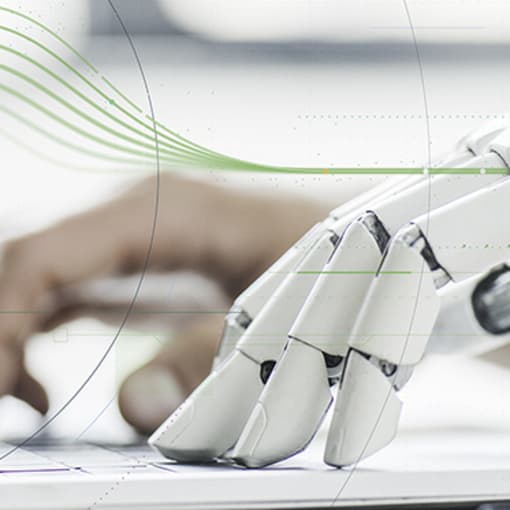Automated intelligence vs. artificial intelligence: What’s the difference?
Today’s technologies pack a lot of similar words and complicated nuances into their meanings. Learn the differences between automated intelligence and AI.
Today’s technologies pack a lot of similar words and complicated nuances into their meanings. Learn the differences between automated intelligence and AI.

Automated intelligence and artificial intelligence (AI):
Key business applications of AI:
The role of automation and intelligent process automation (IPA):
Automated intelligence is a term that conflates real things (for example, automation, intelligent solutions and artificial intelligence) to indicate a vague compilation of them all; however, automation intelligence isn’t really a thing. It’s not, for example, a solution technology companies sell. Rather, it’s a popularized term that gets thrown around to cover a variety of tangentially related technologies.
In most instances, people referencing automated intelligence more likely mean artificial intelligence or automation. Although they can be compatible and complementary, they are distinct categories of technology.
In most instances, people referencing automated intelligence more likely mean artificial intelligence or automation. Although they can be compatible and complementary, they are distinct categories of technology.
AI is a collection of technologies that work together to mimic human intelligence and sometimes human behaviors. To do so, the AI technologies must be fed data and then be able to intelligently process it. True AI must be able to:
AI solutions depend on sophisticated neuro-like pathways to connect data points, as well as on machine learning (ML), a subset of AI, to teach the AI technologies. It’s similar to how a human would learn.
A fun example of AI technologies at work is Spot, Boston Dynamics’ robot “dog” that takes in data as it experiences the world, learns how to better optimize its existence in the world to contribute to on-site business outcomes, and puts those learnings into practice without human guidance.
For many organizations, AI isn’t as flashy or borderline lovable as Spot. But it can still be powerful and game-changing.
In claims processing, insurers are increasingly receiving high-value photographs and videos from customers to document claims. In an automobile accident claim, for example, AI can extract and process important information from submitted content, including:
Another business case for AI is intelligent document processing (IDP), which leverages AI to power document onboarding capabilities and drive new levels of automation, efficiency and accuracy in functions like human resources, customer service and finance. Organizations can use it to apply human-like intelligence to:
An AI-powered IDP solution brings instant value and efficiency to teams that work with document capture, classification, extraction and validation. Hyland IDP helps teams drive operational efficiency, enhance security and compliance, ease IT burdens, modernize processes and meet business goals.
Read the articleHealthcare organizations and patients are seeing increasing uses for AI in diagnostic imaging, too. A recent healthcare- and AI-focused Gartner® report shows expanded AI use for:
> Read more | AI in the workplace
Automation is a system or a project that is applied to a machine; once set up by humans, automation projects should run independently of human instruction by automatically doing the assigned processes that were once manual. An automated system:
In its earliest days, automation looked like simple machines that harnessed the power of earthly elements to operate — think the sails on Medieval windmills that automatically turned with the wind.
Jump forward to the Jacquard loom, which used prepunched cards to assign specific, complex patterns for creation in woven materials, and you have what textile historian Christine Jeryan calls “the great, great, great grandfather of the computer technology we all use today.” The same punched cards concept that the loom used to automate weaving in 1804 were eventually used by IBM to load computer programs onto computers and automate the running of the machine.
Today’s modern automation technology ranges from large-scale machines, like industrial robotics and automated production lines in manufacturing, to robotic process automation (RPA), which records a human’s manual mouse clicks and replicates the process. Regardless of machine size, properly designed and executed RPA projects:
The newest trend in automation is hyperautomation, which tasks organizations with identifying the best pathway forward for strategically leveraging all the automation tools at their disposal. Hyperautomation often results in organizations creating a broader, more cohesive — and more effective — automation strategy. Hyperautomation can be beneficial enterprise-wide, with especially high promise for:

Explore their findings, which include insights on which content intelligence capabilities are ripe to flourish.
No. Automation and AI are distinct concepts, yet they can work together and complement one another.
Automation does not inherently possess artificial intelligence, but it can if ML is in place for the automation process to take in new data, learn from it and begin to make its own improved and informed decisions.
Yes, because intelligent automation takes automation to the next level by giving it the power to learn and make decisions as a human would.
For example, a simple automated data capture technology that is directed by humans cannot learn beyond exactly what its humans programmed it for. It will:
If the simple system is presented with a form it doesn’t recognize, it’s stymied. A simple automated data capture system doesn’t have the ability to work beyond its original scope (though it can still be a great solution).
However, intelligent data capture technology can take in new data. When an unexpected form enters its system or a field entry is misspelled or missing, it can use what it already knows about extracting data to make human-like inferences and decisions, without instruction from humans.
> Read more | 10 insights into the future of intelligent automation
Intelligent process automation (IPA) is one of the tools in AI’s toolbox; it’s not a process itself.
An IPA application differs from AI by being hyperfocused on processes. IPA uses tools like capture software, low-code intelligent process automation platforms, process mining and task mining to intelligently manage business processes with little or no intervention from humans.
> Read more | Intelligent process automation best practices
Every organization needs technology to help them connect their people and their data. Oftentimes, AI and automation strategies are necessary to accelerate those processes and outcomes.
Hyland, a leader in intelligent content solutions, helps customers accelerate customer technology use with both automation and AI solutions.
Hyland Content Intelligence uses ML to enrich content and provide useful insights into data and processes. Reaching across an enterprise’s universe of content and apps, it helps users find information hidden in documents and so they can drive better business decisions. Its robust data security and governance measures provide comprehensive protection and compliance.
Hyland IDP is an advanced intelligent document processing software that provides document capture and processing automation, AI-driven document classification and intelligent data extraction.
As business modernization trends evolve, organizations can stay ahead of the game by working with the best partners.

From Siri and Alexa to customer service chatbots, artificial intelligence (AI) has fundamentally changed many aspects of the way we work — and data capture is no exception.

The terms "artificial intelligence" and "machine learning" are often used interchangeably. Here are key differences between the two technologies transforming modern businesses.

How a comprehensive IT modernization strategy can optimize operations and drive innovation.

Discover how AI-powered document processing works, as well as its benefits, applications and future potential.